- Home
- Josephine Tey
The Expensive Halo: A Fable Without Moral
The Expensive Halo: A Fable Without Moral Read online
Josephine Tey
The Expensive Halo
Josephine Tey
(Elizabeth MacKintosh)
(1896–1952)
The Expensive Halo
A Fable Without Moral
(1931)
Table of Contents
Chapter I
Chapter II
Chapter III
Chapter IV
Chapter V
Chapter VI
Chapter VII
Chapter VIII
Chapter IX
Chapter X
Chapter XI
Chapter XII
Chapter XIII
Chapter XIV
Chapter XV
Chapter XVI
Chapter XVII
Chapter XVIII
Chapter XIX
Chapter I
It had been raining all day, but now a wild red sunset flooded the town with uncanny light, so that the dripping black buildings stood glorified and the hurrying crowds turned their heads, half-consciously, in uneasy wonder at the magnificent west.
Mary Ellis stood by the kitchen table in the basement window, and the light, reflected from the wet pavement, shone round her with a mild radiance very different from the disturbing crimson of the angry sky. It lit her grey hair to a halo, and made her intent, secret-smiling face that of a saint at her devotions. She was icing a cake. And as she piped the pink sugar in careful preordained scrolls on the white plateau, her mind was filled with a radiance which no sunset could produce. By the cake lay a cardboard box containing twenty-four little candles. She had had to buy twenty-four because they were sold by the box. But the little Marsden girl could have the other three. There was no use in keeping them, because never again would she put candles on a cake. Not until she had a grandchild, and that might be never. She hoped Gareth wouldn’t think it babyish of her to do it this once. Babyish people often had an eager nose for babyishness in others. She hadn’t made a birthday cake for many years now. The habit had been dropped during the war, when there was nothing to make a cake with. And somehow, afterwards, people were less overtly sentimental. Symbols counted less. The children had had treats on their birthdays, but there had been no cake with little candles. It was a practical age.
She laid aside the piping-bag and looked at her work with her still, secret smile. A cake for Gareth’s birthday: that’s all it was. But it was, too, the crowning of her own life, and she felt it in all her being. To-morrow her baby was twenty-one; the baby she had not wanted; the baby they had said she would never rear: and it seemed as if her whole existence had been but a preparation for this moment. Her five other children had each in turn achieved their majority and there had been congratulation and pleasure in each event. But to-morrow Gareth would be twenty-one, and her spirit rose up and overflowed in her at the thought.
She chose from the box the more perfect of the candles (it would not matter to the Marsden baby that her three were a little chipped), and began to set them in the cake, carefully because of the still-soft icing. It was strange that the baby whose coming she had resented so passionately should be more a part of her now than he had been in those months before his birth. Even his name was hers. Alfred had said that the baby was to have a Biblical name, like the others. No child of his should have other than a Biblical name. Always on previous occasions, she had agreed for the sake of peace, but this time she had fought him, weak, determined and furious, Now that the puny brat was there she felt that for once it should be hers to do as she liked with. She had borne it, suffered for it, and she should name it. It should be called Gareth. Gareth was the name of the hero in a book which she had been reading, and the word had sung itself through her head during those awful hours. She did not like the name particularly, but that did not matter. All that mattered was that it should he a name of her own choosing and that it should have no Biblical associations.
And Alfred had given in. She had been surprised at the time but too relieved and weary to marvel long. Afterwards she had discovered that the doctor had spoken to Alfred as one man very rarely speaks to another. He had, in his own phrase, put the fear of God in Alfred, and to Alfred, that intimate of God, it was a new sensation. Alfred had agreed that Mary should choose the name.
And he had, of course, changed his doctor. But as there were no more babies that had not mattered very greatly.
Because he was hers in a sense that the others had never been, the sickly, wailing baby had been taken to her heart. When they tried to warn her that he might never make old bones her lips tightened in the little movement with which all her children were familiar, and her chin lifted, Fools! Of course he would live. He was hers, wasn’t he? The only one to be wholly hers. She would see to it that he lived. And it seemed that her son had inherited her spirit, for he not only lived but, in spite of his many illnesses, throve. Her hand hesitated a moment and she smiled at a passing vision of Gareth at the age of seven; a battered little figure, with thin scarred knees, red hair damp and tumbled, one eye dark where a black eye was coming, and the other eye faintly green where a black eye was going. She had marvelled often at the eager spirit which was housed in his shoggly body. When anyone trailed a coat it was Gareth, her sickly baby, who was there to step on it.
There was a tap on the kitchen door, and a girl’s head appeared; a brown head with laughing eyes. Mary glanced round and went on with her work.
“It’s you, Molly,” she said in her calm way. But there was welcome in the words.
Molly came in and closed the door. “I just slipped in for a minute. Is it done?”
“Very near.”
There was silence in the room while the two women hung over the cake. Mary turned it slowly round so that the girl could view it adequately. “It’s lovely!” the girl said, “just lovely “; and they went on looking at it in the silence. The face of each was rapt, and in the quiet they were in complete communion. To both of them the thing was not an erection of cake and sugar, but a symbol.
“He hasn’t come back yet?” Molly asked, still enjoying the white perfection of the cake.
“No.”
“So you don’t know if he’s got it?”
“No, but he may be in any minute.”
“In that case, I’m off, If he’s got it I’ll hear about it soon enough, and if he hasn’t he won’t want me here.”
Mary turned to her with a smile in her grey eyes. “You put in the last one,” she said, and held out a little pink candle.
Molly took it quite solemnly, and, as gravely as though she were laving a foundation stone, pressed the candle down into the bead of sugar waiting for its reception. The circle was perfect.
“There!” she said, and looked a moment longer. Then “He’ll be sick!” she said, and ran laughing from the room. Her light footsteps pattered on the stairs and died away. Mary lifted the cake on its stand, carried it into the pantry, and locked it away in a cupboard. As she took out the key the front door banged. Only two people banged the front door: Gareth and Sara: and it too early for Sara.
Mary wanted to run to the door and read the news in his face: to embrace him whether it was good or bad. Instead, she turned again to the table, brushing the crumbs of icing on to a plate and putting spoons and knife into a bowl of hot water. She had never “spoiled” any of her children. When they thought of her at all they thought of her as a stern mother. She heard the clatter of his descent and turned to greet him, her heart thumping like a girl’s. The door was opened by something between a kick and a shove and he stood on the threshold.
“Well, I’ve got it,” he said. He tried to make his voice sound casual, as if getting one’s first real job were an eve
ryday affair, but triumph radiated from him.
“Isn’t that fine!” was all she said, but he evidently found no anti-climax in her reception.
“Not bad!” he said, and came over to the table, into the reflected light of the sunset. He was going to be twenty-one to-morrow, but he looked eighteen. Small-boned, slight, with sloping shoulders, and something of the appealing immaturity of a lamb in his make-up. His red-fair hair was water-waved over the top of his narrow head; large freckles were sprinkled over his pale skin, and darkish blue eyes looked out from folded eyelids. The eyelids and a slight sag of the flesh by the corners of the mouth suggested ill-health, and the cheek-bones under the eyes were flattened, a peculiarity which gave the face a worn, exhausted look. Something in the slant of the eyelids and the flattened check-bones caused the eyes in repose to have a tortured, searching expression which was entirely misleading. Both his pale mouth and his delicate chin lacked modelling, but his nose jutted at a brave and satisfying angle from his perpendicular forehead, redeeming the face from mediocrity and making it in profile curiously beautiful. In his rapt moments Gareth looked like a tortured saint; medieval and stained-glass. When he came alive he became suddenly a street urchin; individual and impudent.
“The pay’s not much. Five a week. That’s about half what his last one got. But playing the fiddle for Regan is a good advertisement, you know. And he’s promised me more if I’m all right and I stay with him. I’ll be all right, of course, but I don’t know about staying with him. Anyhow, it’s a good beginning. There’s only one Regan, and he has only one violinist, and I’m it. That’s good enough for me.”
In spite of the triumph in his bearing he sounded as if he were trying to convince himself. She wanted to say: “This isn’t what you wanted. You were going to do such big things,” so that she might uncover the hurt place, and having uncovered soothe it. But if he chose to hide it she would say nothing. Her heart yearned over him.
“I always said I’d be independent before I was twenty-one, didn’t I! I wonder what father will have to say now? It’s a fine subject for a sermon, but on the other hand he can’t make it very strong any more, or I’ll just walk out. You can’t bully a chap with five pounds a week.
“You mustn’t talk like that about your father,” she said mechanically.
Her heart missed a beat at the thought of Gareth walking out of the family circle. The others had threatened often to go, but they stayed because staying was convenient for them. Convenience would not weigh with Gareth if he wanted to go. What he wanted to do he would make convenient. He had all the headstrong common-sense of his Irish grandmother. The thought of the house without Gareth was not to be borne. She pushed the dreadful idea down below the surface of her mind and covered it up. She was not going to meet trouble half-way. As a girl she had always seen trouble when it was hull-down, and rushed with all her forces to meet it. Sometimes there had been no trouble there, and she had had a bad time explaining to her reserves why they should have been so unnecessarily mobilised. Sometimes the trouble would have passed below the horizon but for her eager antagonism. And after many years, scarred and wise, she had learned that it is better to face trouble only when it is upon one.
“And, anyhow, it will soon be ten pounds a week.” His eyes shone at the prospect. No one would think that this was the boy who had agonised to play music that was music as he understood the term. The boy who had gone jobless for months because he believed in himself and his talent, and was not going to prostitute them. Was the relief so great that he was really glad about Regan’s? It must, she thought sympathetically, be wonderful not to have to struggle any longer; to turn back from the thin air and the cold and the starvation of the heights to comfort and security.
Absent-mindedly he licked his slender fore-finger, picked up a crumb of icing from the table, and put it in his mouth. His eyes, bright with the thought of five pounds a week, awoke to a more immediate interest.
“What have you been making?” he demanded.
“Just a cake.”
“Iced cake, though. Where is it?”
“You can’t have a piece just now. I’ve just this minute put the finishing touches to the icing.”
“Well, let me have a look at it. Is it plum cake?”
When she had unlocked the cupboard and switched on the light so that the might see, she turned anxiously to watch him. Was he going to play down to her, be nice to her because she had been sentimental and mustn’t be let down? Or would he feel in his bones, as she did, that this was a symbol of achievement?
She saw his careless eyes grow suddenly intent. There was a little pause. “Mum!” he said, and turned to her smiling. As their eyes met his smile faded, and they looked at each other for a moment curiously over the chasm which separates one human being from another, reaching out to each other. Then with a swift movement he clipped her neck in a boyish embrace, and rubbed his cheek against hers.
“I wouldn’t exchange you for anything,” he said.
As the released her he stretched out his hand to pick off a little knob of icing.
“Don’t, Gareth!” she said sharply, the doting mother disappointing in the outraged housewife. It isn’t set yet.”
“Oh, you’re a bully,” he said, desisting. He pushed his hands into his trousers pockets as if to keep them out of mischief. “Tea as usual? All right. I’ll be back in good time. It isn’t sausages, by any chance, I suppose?”
“I shouldn’t be surprised.”
“All right. Shan’t be long.” And he disappeared.
She knew where he was going: next door to tell Molly the news. But she knew no jealousy at the thought. Some day these two would marry. From their infancy they had wept and laughed and fought together, shielding each other in delinquencies, cursing each other in discrepancies, but always necessary to each other. When they married there would be little disturbance of the family. She would never lose Gareth to Molly, because the part of Gareth which was Molly’s had always been Molly’s. The part which was hers would never be trespassed on now.
She turned happily to put the kettle on the stove.
Chapter II
Tea at number seventeen Sark Street was ostensibly at halt-past six on week days. In reality it was at the moment when Mr. Ellis arrived home. If the members of his family arrived before him they waited for their meal, no matter how tired and hungry they might be, until he arrived. If, on the other hand, he arrived first, tea was set on the table with the utmost dispatch, and his family, as they dribbled in, retrieved their fish or sausage from the gas oven. As children this had seemed to them the appropriate and fitting thing; they had taken it as a matter of course; not because their father was the bread-winner, but because he was Father. As one by one they became breadwinners, however, and self-respect and independence rose in them, there was muted grumbling, and Sara, always the kicker against pricks, had first uttered that unspeakable heresy: “Father’s selfishness.” Inwardly dismayed but outwardly forbidding, their mother had subdued them. Mary Ellis would allow none of her brood to criticise their father. Another woman would have snubbed them and forbidden the subject.
Mary took to cooking each person’s share as they came in and having her own tea in snatches, so that her family, exasperated and beaten, ordered her to stop it, and thereafter fetched their share from the oven with as good a grace as they could muster. The only exception to the rule was Matt, the eldest. Matt had slipped from under his father’s jurisdiction in one adroit movement by becoming a reporter on the Daily Clarion. As a newspaper man, his hours were incalculable, and no one could call him a liar when he said he was on a job. He had meals when he came in, could never go to Wednesday night prayer meeting (a fact which his baffled and angry parent assured him would inevitably lead him to hell), and very often managed to absent himself from even the Sunday meetings, an achievement which in the Ellis family was equivalent to an escape front Dartmoor together with the presentation of the freedom of the City of London,
> Alfred Ellis belonged to a sect which were a kind of superior Plymouth Brethren. A very greatly superior kind, of course. They disapproved of Plymouth Brethren, and were rather hurt and scornful when any analogy was drawn between the beliefs and practices of their respective sects. But no amount of explanation seemed to convince his acquaintances and the customers who carne to his shop of the essential differences between his “meeting” and all others, and Alfred Ellis was filled with contempt for the understanding of these unsaved and unenlightened. His father had been a pillar of the local Congregational church; a shrewd old man, narrow in his views but upright and fair-dealing; Mary remembered him with gratitude. He had left Alfred a half share in the grocery business round the corner (a business which was then suburban but which was now almost in town) and the house in which they were now living. Within two years Alfred, who had never liked having to consult other people, had bought his younger brother out of the business. A monarchy was more desirable than sharing a consulate. Besides, his brother and he had clashed several times over the matter of business methods. His brother, poor fool, had seemed not to realise that business and religion were two different things. There had been a ghastly night when John had told him “exactly what he thought”; among the things he thought being that their father must be turning in his grave at Alfred’s methods of making money. After that Alfred decided that John must go.
It had been a tremendous strain on the business, the buying out of John, but John had been willing to go (he said he wanted to go to Australia, where they were all descendants of convicts, so he’d always heard, and probably wouldn’t bother to preach while they sanded the sugar), and so Alfred had managed it. When their strained circumstances were revealed to her, Mary had wanted to give up the big grey house in the terrace, which had always seemed too big for themselves and their two children, and take a little one further out. But Alfred had said no; that it was a first-rate money maker, the house. They could keep lodgers. They would turn a liability into an asset. The Lord had shown them the way.

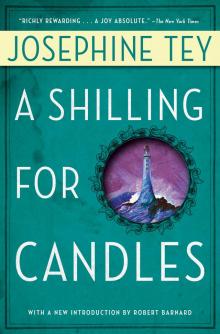 A Shilling for Candles
A Shilling for Candles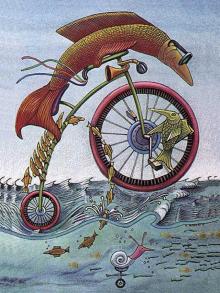 The Singing Sands
The Singing Sands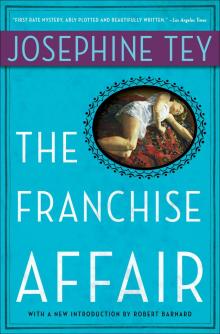 The Franchise Affair
The Franchise Affair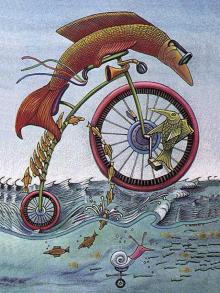 Daughter of Time
Daughter of Time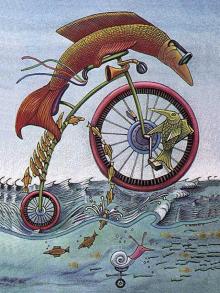 To Love and Be Wise
To Love and Be Wise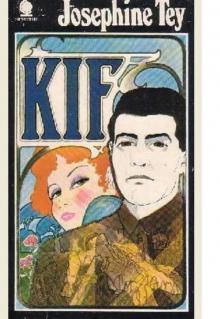 Kif
Kif The Expensive Halo: A Fable Without Moral
The Expensive Halo: A Fable Without Moral The Privateer
The Privateer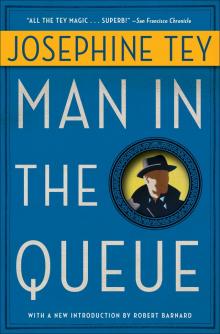 The Man in the Queue
The Man in the Queue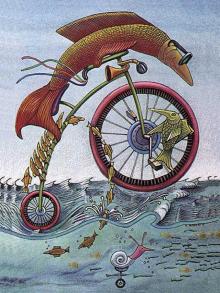 Miss Pym Disposes
Miss Pym Disposes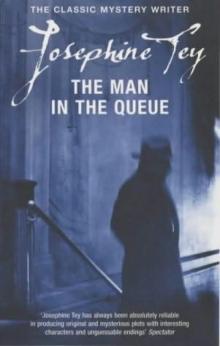 The Man in the Queue ag-1
The Man in the Queue ag-1 Brat Farrar
Brat Farrar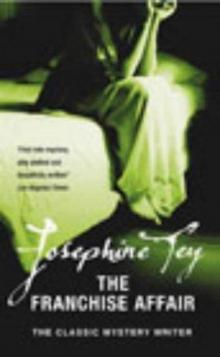 The Franchise Affair ag-3
The Franchise Affair ag-3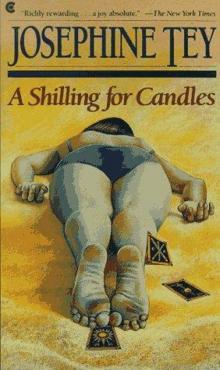 A Shilling for Candles ag-2
A Shilling for Candles ag-2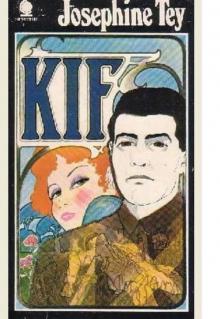 Kif: An Unvarnished History
Kif: An Unvarnished History The Expensive Halo
The Expensive Halo The Singing Sands ag-6
The Singing Sands ag-6 To Love and Be Wise ag-4
To Love and Be Wise ag-4